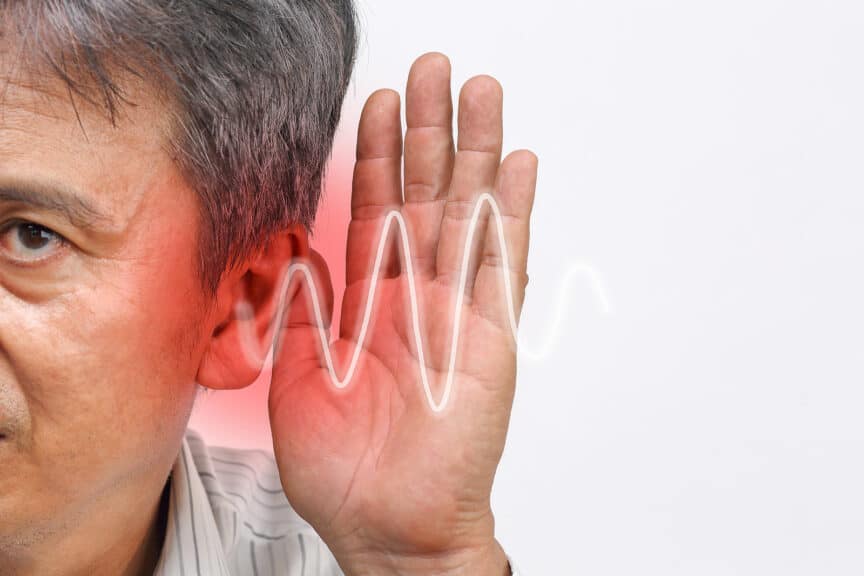Did you know that people with osteoporosis can be twice as likely to experience hearing loss? Research shows that osteoporosis is a factor that increases the risk of developing impaired hearing. If you have osteoporosis, it is important to also prioritize your hearing health.
What is Osteoporosis?
Bones are living tissue that are constantly breaking down and being replaced by new bone tissue. Osteoporosis is a condition that describes a slowing down of new bone tissue being developed. This causes lower bone mass which weakens the bones making them increasingly vulnerable to breakage. The fragility produced by reduced bone mass can also lead to fractures, the most common fractures are in the wrists, hip, and spine.
According to the International Osteoporosis Foundation, 44 million people live with osteoporosis or low bone mass. Oftentimes, people are not aware that they have osteoporosis until they experience a fracture or breakage. Osteoporosis can have significant effects on mobility by producing chronic pain. Studies show that it can also increase the risk of developing hearing loss, a permanent medical condition that reduces capacity to hear and process speech as well as sound.
Link Between Hearing Loss & Osteoporosis
Studies highlight that osteoporosis can contribute to sudden sensorineural hearing loss (SSHL). This is a type of hearing loss that occurs fairly rapidly – either at once or over the course of a few days. SSHL also usually happens in one ear and is caused by damage of the sensory components that are in the inner ear. According to the National Institutes of Health, nearly 50% of people who experience SSHL will recover some or most of their hearing spontaneously.
A significant study that investigates the link between osteoporosis and SSHL was published in the The Journal of Clinical Endocrinology & Metabolism. Researchers at the Chi Mei Medical Center in Taiwan assessed data on patients both with and without osteoporosis provided by a national health database. This included data on 10,660 people with diagnosed osteoporosis and 31,980 people without it. Researchers found that:
- People with osteoporosis were 76% more likely to develop sudden sensorineural hearing loss compared to people without osteoporosis.
- Women with osteoporosis were 87% more likely to develop SSHL compared to men.
This data highlights what extensive research shows which is that osteoporosis can significantly increase the risk of developing hearing loss.
Impact of Osteoporosis on Hearing Health
You are likely wondering how osteoporosis and hearing health are even related. Well it is useful to know a little bit more about the auditory system which is the sensory system for hearing. The auditory system consists of the ears and brain which work together to absorb and process speech as well as sound. This happens through a series of actions and components that are integral to how we hear and understand what we hear. This includes the ossicles in the inner ear. These are three tiny bones that are connected – they are among the smallest bones in the human body. The ossicles help propel soundwaves further into the inner ear where they are processed and sent to the brain, a critical step in the hearing process. Osteoporosis can weaken bones which reduces their capacity to carry out their essetual function, resulting in hearing loss.
Protecting Your Hearing Health
There are simple strategies you can practice to reduce the risk of hearing loss. This is especially important if you have osteoporosis or lower bone mass. A few tips you can implement include:
- Get hearing tested regularly: having your hearing tested regularly allows you to monitor your hearing health. Hearing evaluations involve a painless and noninvasive process that measures hearing capacity in both ears. This identifies any hearing loss and the degree of impairment present. If you don’t have hearing loss, getting your hearing tested allows you to identify a baseline for your hearing health. This allows you to then easily catch changes you may experience over time.
- Priotizie Bone Health: if you have osteoporosis or lower bone mass, it is important to take care of your bones! A few ways you can do this is by regularly engaging in physical activities like walking, tennis, bike riding etc. as well as eating foods that are rich in vitamin D and calcium.
Contact us today to learn more about hearing loss and ways you can protect your hearing health.

